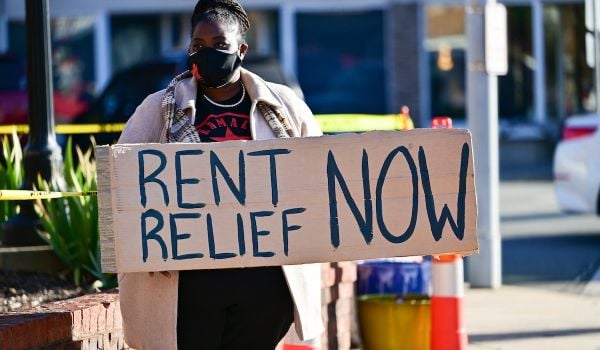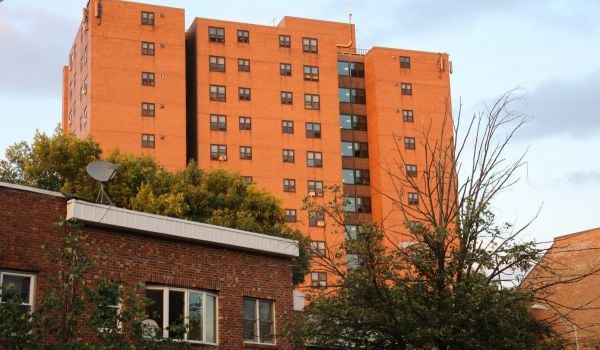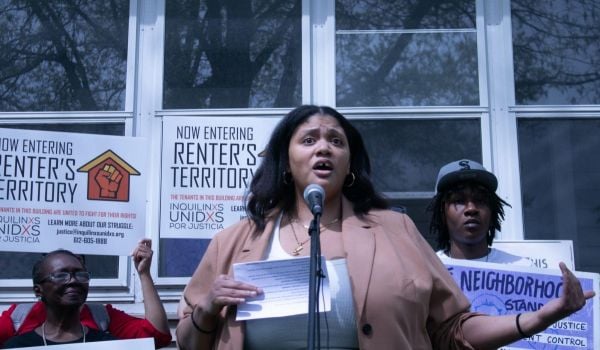Last August, just days before Hurricane Dorian was set to make landfall in South Florida, the Miami New Times reported that Maria Cazañes, a 75-year-old Miami Beach resident, had been evicted from her home — left on the street along with all of the belongings she’d gathered over the nearly three decades she’d been in the apartment. Cazañes had reportedly been making a cafecito when the landlord showed up with the police; her belongings were tossed off the second-floor balcony onto the sidewalk.
The news made international headlines, and the official reaction was swift. Almost immediately, the mayor of Miami-Dade County said that police in the county would no longer assist with evictions during emergencies. The County Commission passed a bill preventing evictions from any public or county-owned affordable housing during natural disasters. And State Rep. Michael Grieco, who says he lives within walking distance of the apartment Cazañes was forced out of, sponsored a state bill that would prevent evictions during states of emergency. The eviction of Cazañes was “obviously kind of an eye-opener,” Grieco says.
“It showed to me and to many that sometimes you have to take a step back in government and think, and maybe do a little heart check, and decide whether or not you should be doing something,” Grieco says. “Clearly, that was a fail.”
Initially, Grieco says, the bill that he proposed — alongside companion legislation introduced by State Sen. Jason Pizzo — would have applied to all emergency situations, including the current emergency related to the coronavirus outbreak. But by the time the bill got a hearing, it had been “watered down” so that it would only apply to the periods immediately before and during hurricanes, he says. Eventually, for political reasons that Grieco didn’t fully seem to understand or feel like explaining, the bill was killed altogether, and is now listed as “indefinitely postponed and withdrawn from consideration.”
“It’s fascinating to me,” Grieco says. “I’m not known to be some leftwing nut. I’m a pretty moderate Democrat. But I don’t think it’s an off-the-charts progressive idea to not put people out on the street when there’s a pandemic or a hurricane coming.”
Like many other cities, Miami-Dade County is largely shut down, and the mayor of Miami has tested positive for COVID-19. The Miami-Dade Police Department said it would stop carrying out all evictions during the crisis. And advocates are now pushing for a moratorium on evictions statewide — something they feel should already be in place, especially given South Florida’s deep familiarity with emergencies related to natural disasters. Groups like the Community Justice Project and Legal Services of Greater Miami spent time earlier this year advocating for the statewide ban on evictions during emergencies that failed in the state legislature. But now they’ve turned their attention to the courts, asking the chief judge of the 11th Circuit Court to suspend deadlines for tenants to respond to eviction notices. Without those suspended deadlines, advocates say, even tenants in Miami-Dade County, where police are no longer carrying out evictions, would be at greater risk, because they’d be forced to go to the courthouse to respond to eviction notices within five days.
As the groups wrote in a letter earlier this week, “Natural disasters and health crises alike aggravate and intensify an already unjust and unequal distribution of power and resources in our communities. Gone unchecked, these public emergencies can end up further catalyzing the housing crisis that Floridians all across the state have been struggling to overcome.”
Denise Ghartey, a “justice catalyst fellow” at the Community Justice Project in Miami, says the courts need to suspend, or “toll,” the legal proceedings of evictions during the coronavirus outbreak. The group has also released a set of pandemic-related demands around housing security that call for all sheriffs and police departments to cease evictions, for the state to lift preemptions on local tenant protections, and for the legislature to pass an eviction-moratorium bill like the one introduced by Rep. Grieco and Sen. Pizzo. She also says that while Miami-Dade County’s ban on emergency evictions in public housing that was passed last year is somewhat limited in scope, its passage is a testament to “years and years of organizing, and communities knowing what they need and asking for it.” By the time officials were ready to act after a particularly egregious eviction made headlines, the demands were already in place, Ghartey says.
“I think it’s really special, but it’s also really sad and unfortunate, because this is also coming off of years of loss and years of pain,” she says.
Miami-Dade County Commissioner Jose “Pepe” Diaz, who sponsored the ban on public-housing evictions during emergencies, says that the eviction of Maria Cazañes made it clear that evictions during emergencies were a bad idea. But even if evictions are temporarily suspended, the economic fallout of the coronavirus pandemic could put vulnerable tenants in an even worse position once any emergency protections are officially lifted.
“The biggest problem right now is with people that have a paycheck that is month to month or week to week which is a big part of the population,” Diaz says. “What’s going to happen to them? How are they going to pay [rent] if they don’t get paid themselves?”
Circumstances are changing quickly. The National Multifamily Housing Council recently called for the federal government to offer cash assistance to renters to help them get through the coronavirus crisis — a move which, presumably, would allow landlords to keep collecting rent and avoid the worst of the economic fallout, and which the group said would be “more effective than efforts like moratoriums on evictions.” As of this writing, federal officials were weighing the possibility of direct cash assistance to help people get through the crisis.
Mike Grieco, the state representative, says that he has talked to the governor’s office about issuing an eviction moratorium like the one that would have been implemented by the bill he sponsored. He says he’s sensitive to property owners’ concerns about losing money to pay mortgages and maintenance costs, and that there will have to be a “correction” to the cascade of financial losses at some point. But what’s needed immediately is fairly obvious, he says.
“There is a ripple effect to it, but in the current circumstances, the banks can eat it better than the landlords, and the landlords can eat it better than the tenants,” Grieco says.
This article is part of Backyard, a newsletter exploring scalable solutions to make housing fairer, more affordable and more environmentally sustainable. Subscribe to our weekly Backyard newsletter.

Jared Brey is Next City's housing correspondent, based in Philadelphia. He is a former staff writer at Philadelphia magazine and PlanPhilly, and his work has appeared in Columbia Journalism Review, Landscape Architecture Magazine, U.S. News & World Report, Philadelphia Weekly, and other publications.
Follow Jared .(JavaScript must be enabled to view this email address)


















